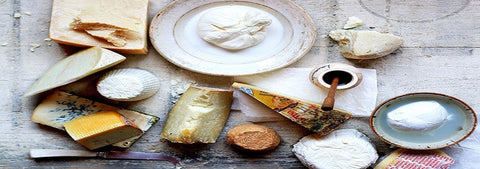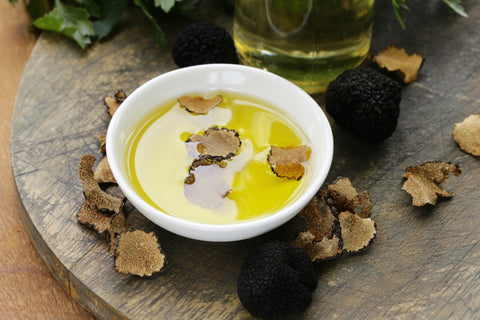Italian cheeses have always been among the most appreciated, with more than 450 traditional cheeses registered by the regions, in addition to the 40 kinds of cheese with a designation of origin recognized by the EU.
Here are the main categories of Italian cheeses:
Refined Italian Cheeses
The maturing of cheese is a craft for a few. There is no real school for this operation, but it is an art of the individual who has developed sensitivity after numerous experiments. The great refiners are precisely these people who, through their love for the alchemy of ingredients and tastes, have been able to give an added value to tome, bringing them closer to other flavors or aromas. There are many examples: refined under straw, under ash, or refined with fruit, such as berries, oranges, mango. In very special cases, chocolate, beer, and rum have been used. For those who like to experiment with flavor, we certainly dedicate this selection of aged cheeses.
Goat’s cheese
Goat’s milk cheeses are those cheeses made from goat’s milk, and are very lean, low in fat and cholesterol. They are easily digestible even for those with lactose intolerance problems. Their taste is sweetish and for this reason, they are often refined, flavored and spicy offering more variants of taste.
Blue cheeses
The planet of blue-veined cheeses is a delicious world, full of taste. Blue-veined cheese is what our grandparents and fathers called “green cheese”, embellished with the mold of the Penicillium. In our wide selection, you can indulge yourself because you’ll find not only simple blue cheese but also refined blue cheese. You will find a riot of taste among the notes of bluish mold and various refinements, such as those with berries (Blue 61 above all), oseleta marc, white raisin wine, rum and chocolate (the very tasty Blu Dominik), chestnut leaves, black tea and much more.
Alpine cheeses
Eating a mountain pasture cheese means diving into the most beautiful places of our most ancestral and pastoral Italian mountains. A unique, emotional, unpredictable experience. For those who love cheese: the “non plus ultra” of the passion for cheese!
Fresh cheeses
From North to South the tradition of fresh food accompanies the local culture, from Castella Trevigiana DOP to Robiola di Roccaverano DOP. From the simple caciotta with aromatic herbs to the fresh and soft provole. For the pleasure of a colorful, dynamic, sparkling table that loves the sun, music and the carefree life.
Rare Italian cheeses
Here we jealously guard the rarities of the Italian dairy landscape, those local products with short runs difficult to find, such as malga cheeses. These are the rarest and most unique because they are handmade, impossible to replicate. Each cheese has its history, its path, its own extraordinary identity. Behind these white works of art, some shepherds live in ancestral, ancient environments that renew the transhumance, the pasture, the true history of the deepest Italy. This is also why we choose them: because they represent more than ever our philosophy of searching for the good, clean and fair. In short: you have to take a look at our treasure chest of the precious
Pecorino cheese
These are cheeses made with sheep’s (sheep’s) milk. It differs from cow’s milk for the percentage of fat and casein present, which is more than double. This makes them extremely rich and nutritious. There are different varieties in various regions, especially in central and southern Italy. The European Union recognizes 8 Pecorino DOP. These are Pecorino Romano, Pecorino Sardo, Pecorino Toscano, Pecorino di Picinisco, Pecorino Crotonese, Pecorino Siciliano, Pecorino di Filiano and Pecorino delle Balze Volterrane. The fresh pecorino cheeses have a delicate taste, while the seasoned ones have stronger and tastier aromatic notes.
Lactose-free cheeses
This selection of cheeses dedicated to those who are lactose intolerant. Intolerance is born because intestinal cells produce very little lactase enzyme. (i.e. the person responsible for the absorption of this type of sugar.) This enzyme has been present in each of us since birth. However, as we grow its production decreases, making it increasingly difficult to assimilate lactose. And it is precisely when it is not assimilated that problems are created at the intestinal level. It is where this sugar ferments and gives a sense of swelling and other symptoms. That is why lactose-free cheese is an excellent solution for people suffering from this intolerance.
Seasoned cheeses
The selection of these mature cheeses that can be purchased online is the result of a careful and wise selection among the best local and regional producers. The “matured” cheese is a product that requires preparation, experience, genuine raw materials and a processing method capable of treating properties and characteristics without altering its goodness. Try our mature cheeses for sale online: they are delicious and of excellent quality!
Drunken cheeses
These cheeses are really special. The taste of milk combined with that of wine form a combination of great emotions! We are talking about rare works of art that are difficult to find because they are created by cheese-makers in limited numbers and with a preparation that needs care and time. The drunk cheeses need first the maturing and then the aging period (drunkenness, in this case). The duration of immersion in the wine and under the marc varies from 8 to 10 days for mature cheeses and 30 days for aged ones. Once extracted, they are dried and cleaned, then left to mature for another 15 or 30 days before tasting them. What better drunken cheese for you to try than the one with the “Ubriaco” mark? We are talking about Antonio Carpenedo, one of the greatest cheese refiners in the dairy world. The products of his Carpenedo Dairy are a unique experience!
Cow cheeses
These are the most common cheeses, those made with cow’s milk, i.e. those that cover the vast majority of the world’s cheese production. There are many types of dairy cows, but what is probably the most important in Italy is the Brown breed, which was once called Bruna Alpina.



Post A Comment (0)